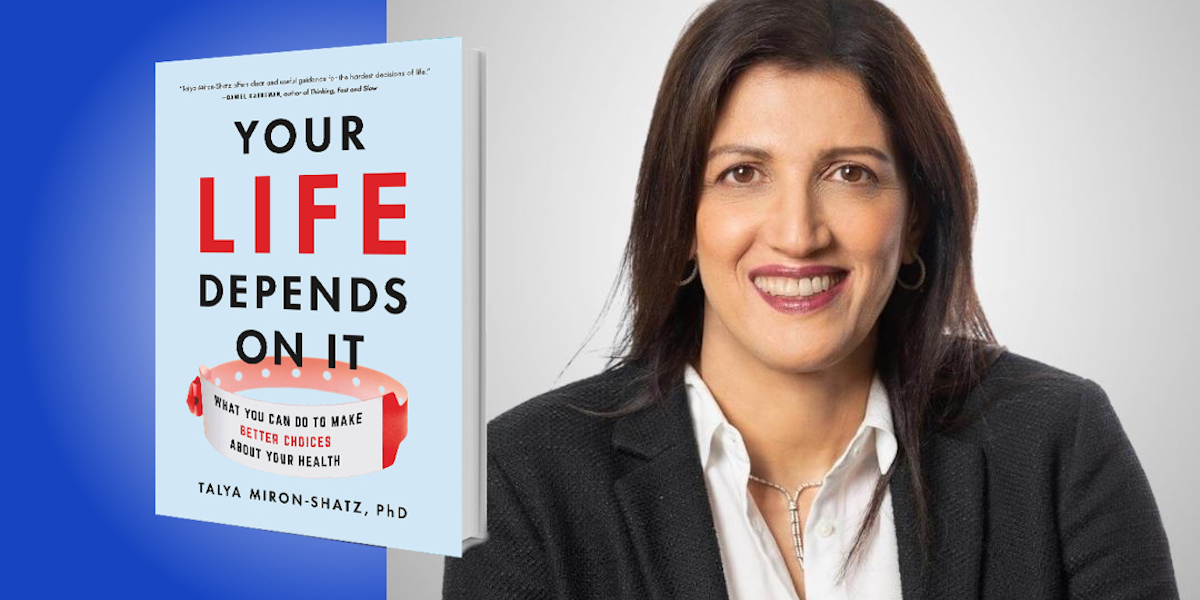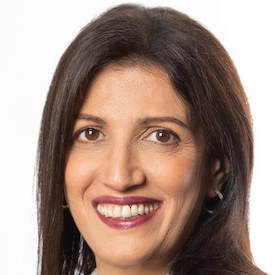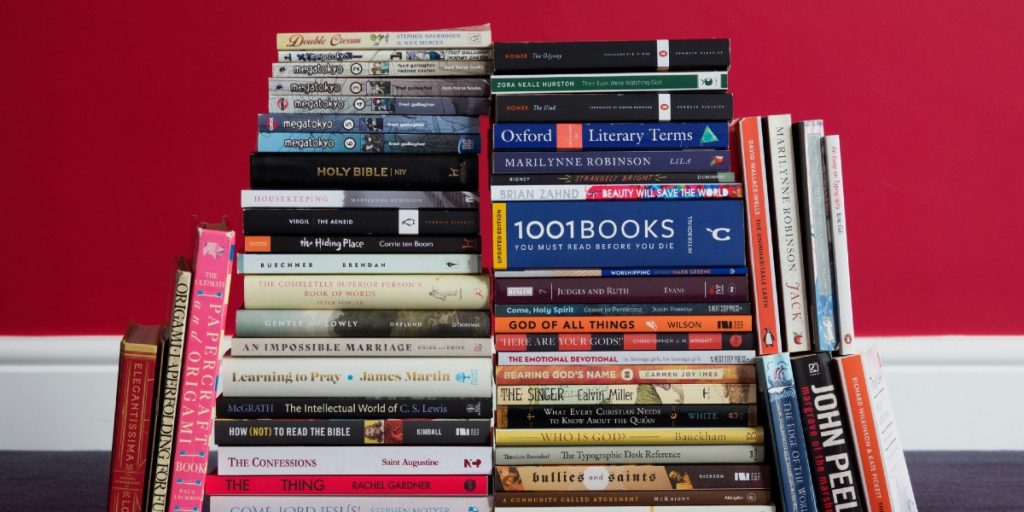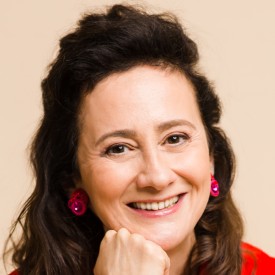Dr. Talya Miron-Shatz is an expert in social psychology and behavioral economics, and a protégé of Nobel Prize winner Daniel Kahneman. For the past 18 years, she has been studying trends in people’s health and medical decisions. It’s become increasingly clear during the pandemic that we need to know how to make smart health choices.
Below, Talya shares 5 key insights from her new book, Your Life Depends on It: What You Can Do to Make Better Choices About Your Health. Listen to the audio version—read by Talya herself—in the Next Big Idea App.
1. You are a healthcare consumer.
You are already a consumer in many other domains—you choose what jeans to wear and what to watch on Netflix. Nobody tells you what to wear or watch. In medicine, too, we have veered away from the paternalistic model where the doctor calls all the shots (pun intended). Control is now in our hands, but there’s a difference: With jeans or a TV show, the consequences mean next to nothing. With our health, they matter a lot, and when we mess them up, we are the ones who suffer. The more important these decisions are, the more vulnerable we are, and the tougher the choice becomes.
I mess up, too. Years ago, I hurt my back, but the doctor dismissed it and didn’t give me anything for the excruciating pain. A few days later, I returned to him, and he escalated to a morphine patch, which he assured me had no side effects. In hindsight, I should have known “no side effects” made no sense. I was already a scientist studying medical decision-making. I could search the literature to learn all about morphine, but I was too sore to look up whether the patch would work, what the risks were, and what the alternatives were. Too miserable to read the brochure (in the tiniest font), I accepted the patch. I’d have been able to wrap my head around this decision in my normal state, but in my pained condition, this was impossible—you can’t assume that you’ll be a capable and savvy health consumer when the time calls for it.
“With jeans or a TV show, the consequences mean next to nothing. With our health, they matter a lot, and when we mess them up, we are the ones who suffer.”
This is why we need to preemptively build skills to deal with these choices. You need to know how to ask the right questions, distinguish information from misinformation, and make the best health choices for you and your loved ones when at home, with your doctor, or in the hospital. Even if you are a doctor, you need to practice this muscle.
2. A trusting relationship is key.
Relationships with trust are crucial when it comes to your healthcare providers. This is more than a touchy-feely effect. For example, when HIV patients say “my doctor knows me as a person,” they’re more likely to stick with their medication. We all value, seek, and need this connection.
I was the first researcher ever to analyze thank-you letters to physicians. What I found was fascinating: People are just as likely to thank their doctors for their personality and how they connected with the patient as they are for the actual medical care. In fact, as patients, we are very attuned to the emotional side of the interaction. People remembered and mentioned every detail, like having the technician hold their hand during an exam. On the medical side, they would just say they got “great care.”
I saw this in action when my mother broke her hip joint. The surgeon came to see her and never made eye contact once. Way to gain a patient’s trust, right? After he left, my mom expressed her doubts. “What kind of a doctor is this?” she asked. She was tiny and broken, but still insisted on feeling like her would-be surgeon cared about her. “I don’t want him,” was her verdict.
“Seek out doctors who connect with and listen to you, and you’ll likely be healthier.”
Medical schools focus so much on science education, but at the end of the day, feeling cared for matters way more than whether your physician understands organic chemistry. Seek out doctors who connect with and listen to you, and you’ll likely be healthier.
“What kind of a doctor is this?” is a question you should always ask before letting anyone prescribe you psychiatric medication, diagnose cancer, or fix your hip joint. It’s really two questions: What is the quality of the doctor’s work, and what is he or she like as a human being? Both of these questions are vitally important.
3. Ask about what matters.
One tool I created for making better health and medical choices is called “ask about what matters.” Use it whenever a doctor proposes a medication, test, or procedure—anything you need to decide on. Be sure to ask:
- What are the risks?
- What are the benefits?
- What are the alternatives?
These questions allow you to get information that may not be aligned with the course of action your doctor has already chosen. Your doctor’s visits can greatly improve by allowing you to take an active role. I deliberately use the word “allow” because we often believe it is not our place to ask. The more people make it a habit to ask these questions, the more acceptable these questions become, and the less doctors will feel like these questions are undermining their authority.
“The more people make it a habit to ask these questions, the more acceptable these questions become, and the less doctors will feel like these questions are undermining their authority.”
“Ask about what matters” recently helped my friend Rene. She is an over-achieving marketing professor, and she over-achieves in sports, too—which is how she messed up her knee. The doctor was about to schedule her for surgery, when Rene asked about what matters to probe further. The risks: being in a cast for four to six weeks, which is very restrictive. The benefits: high success rates for full recovery. The alternatives: physical therapy—which the surgeon wasn’t excited to tell Rene about, but he also didn’t want to withhold information or flat-out lie. “But nobody persists with that, and then they have to have surgery anyway,” the doctor said.
Rene did not get to where she is in life without being remarkably persistent. Persistence is her middle name. She signed up for physical therapy, completed the course, and achieved full recovery without being completely out of commission for six weeks. She would have agreed to surgery and never would have learned about the option that suited her better if she hadn’t asked about what matters. So remember: Ask about the risks, benefits, alternatives.
4. Do not DIY your health and medical choices.
This is tough to swallow, especially for smart, capable individuals. We are used to hearing that “You can if you think you can,” and that we should unleash the giant within. These ideas can be very empowering, but they also have their limit—otherwise I’d be a 5-foot-8 blonde. Seriously, even if you have an MBA from an Ivy League school, making health decisions is hard. There are several barriers that we cannot and should not be asked to overcome on our own.
“The more I work with healthcare organizations, advertisers, pharma, and digital developers, the more I realize that it is their responsibility to create materials at a 5th-grade level, and to talk about numbers in a natural format.”
One major barrier is understanding what our doctors are saying, because they often speak medicalese. Take it from Dr. Mike, who I interviewed in the book. In one of his videos (about child vaccinations) he says, “You hear people screaming all of these things, you don’t know what to believe. I empathize with the person who doesn’t have a great medical education to understand what’s true and what’s not.” And most of us don’t have a great medical education.
Actually, some of our barriers are also barriers for our doctors. Like understanding probabilities, which stump us, unless they are presented in a way that is natural for us (and for our doctors) to understand. Try “out of every 10,000 people in your condition, three will have a severe side effect”—easier and much more intuitive than talking about 0.03 percent.
The more I study this, and the more I work with healthcare organizations, advertisers, pharma, and digital developers, the more I realize that it is their responsibility to create materials at a 5th-grade level, and to talk about numbers in a natural format. They need to make sure this happens in 100 out of 100 of cases.
I’m telling you this so that the next time you don’t understand, you’ll know that it’s not your fault. And as an accomplished, driven individual, you can help demand change.
“You may not be thinking about health and medical choices, but you are making them all the time—even if you do this by deciding to ignore them altogether.”
5. Your life depends on it.
You’ve been making health decisions since you were a toddler. You stuck your finger in a steaming cup of water, and it burned. You associated your action with the unpleasant consequence, and you never did it again. But that was easy—it required no thinking or discipline. As a grown-up, you know better than to stick your finger in a steaming cup of anything. But this does not guarantee that you take great care of yourself.
In fact, adult life offers endless ways of messing with our bodies. Not getting enough sleep, getting too little exercise, having too much alcohol, ingesting various other substances, going clubbing mask-less during a pandemic, scarfing down a burger two nights in a row, or indulging whatever your vice of choice is. In the moment, these behaviors can feel good. If they didn’t, you’d probably be avoiding them altogether.
Acting on the knowledge that these behaviors aren’t ideal requires too much discipline, and too much thinking. When the consequences finally arrive, undoing them is difficult, if not impossible. Try erasing your age lines when you’re a 43-year-old who, in her 20s, smoked and never applied sunscreen.
If you’re looking over your shoulder and wondering how I know all this about you, it’s because you are not alone. Many of us choose a smaller reward now over a larger reward, like better health, later. You may not be thinking about health and medical choices, but you are making them all the time—even if you do this by deciding to ignore them altogether.
So, power up your abilities to make health and medical choices, and stay on top of them, as you do with your other choices. After all, your life depends on it.
To listen to the audio version read by author Talya Miron-Shatz, download the Next Big Idea App today:































